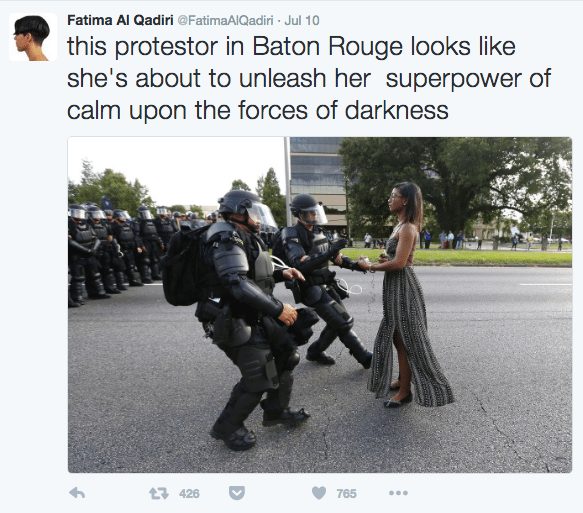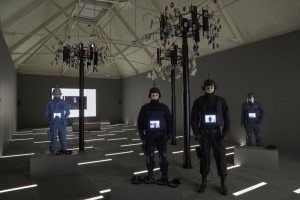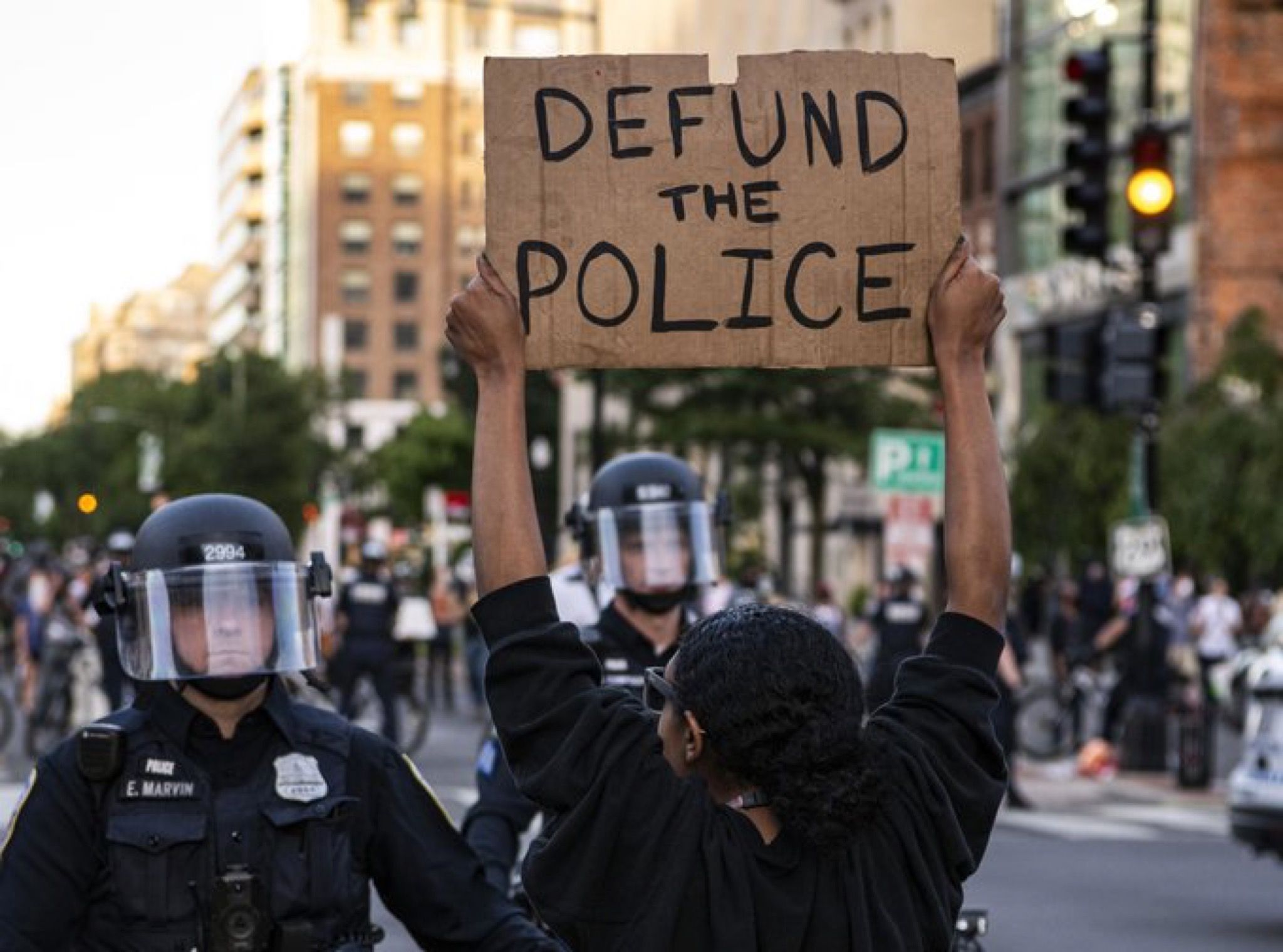“A Planetary Crisis of Policing”
Three years after #BlackLivesMatter began, the wave of killings has not stopped. In this conversation, the musician FATIMA AL QADIRI speaks about the global crisis with the editors of a book on militarized policing.
Two months ago, ahead of the third anniversary of the start of #BlackLivesMatter, 032c arranged an interview between musician Fatima Al Qadiri and academics Jordan T Camp and Christina Heatherton.
Since then, 186 people have been killed by police officers in America. Last week, protests erupted across the world in response to the shootings of Philando Castile and Alton Sterling, two ordinary people executed live on phone cameras. One of the protests ended with another death by police: Micah Johnson, a Dallas shooter who said that he wanted to “kill white people, especially white officers.”
Both Al Qadiri, and Camp and Heatherton confront this in their works, which approach state-sanctioned violence and police brutality in our stark present.
Kuwait-born, Berlin-based musician Al Qadiri’s Brute, released earlier this year, is a largely instrumental album, aimed at what she called the “savagery” of the state security apparatus, the title a counter to the extremely loaded term “thug.” Even its artwork, by NY artist Josh Kline, shown above, presses the point: the Teletubbie Po is now the Popo, looking nervous and pale underneath the protective polycarbonates.
Jordan T Camp and Christina Heatherton meanwhile edited a recent book, Policing the Planet, collecting together perspectives from writers, thinkers, organizers and activists on the failure of policing, the carceral state, and our global state of permanent war: one of those interviewed was Patrisse Colours, who three years ago this month coined the hashtag #BlackLivesMatter following the acquittal of George Zimmerman for the murder of Trayvon Martin.
You can read an edited transcript of the conversation below.
Fatima Al Qadiri: The reason why I named the album Brute was that I was inspired by the word “thug”, so the Thug Nation chapter was extremely meaningful for me. The writer [Robin D. G. Kelley] breaks the word down, and how it is used to differentiate the criminal element from the “Good Negro”, and requires black people to prove that they are not thugs – and the use of that term to brand them as the undeserving dead.
“I wanted to represent the savagery that I was seeing used against civilian populations by the police. The word “brute” came close.” – Fatima Al Qadiri
This was just what I needed to read myself, because I’ve been trying to find a word to use against the police. There have been so many words, like pigs and so on, but I wanted to represent the savagery that I was seeing used against civilian populations by the police. The word “brute” came close to it because it contains a lot of savagery, but also, in English, it has a dandyish, almost 1950s-ish sense: “Oh, that brute!”
Jordan T Camp: Policing the Planet was written in response to the ways that these words justify the militarization of public space – which in turn reflects on your first album, based on the invasion of Kuwait. We really wanted to show the links between the policing we see in crisis situations as a result of these protests, and permanent war. Another thing that resonates is the urge to criminalize dissent: you’ve said that the album is written in large part to show that protest is no longer legal in the West, which is a big part of the book.
Fatima Al Qadiri: This criminalization of protest is so interesting. From what I’ve seen as an observer a thousand miles away from the States at the time of writing the record, there were two strains of conversation, and freedom of speech almost exclusively was covering written and verbal content but not actions on the street: that somehow protest was not legal, even though in US law, to my understanding, freedom of speech covers protest.
Christina Heatherton: Throughout the book we interviewed a lot of organizers and scholars, and we came back a lot to the interlocking nature of the history of suppression of political dissent, and how this lays the groundwork for the policing of cities. For example, organizer Hamid Kahn, who is the head of the Stop LAPD Spying coalition in Los Angeles, draws this line between everyday intensive policing that is tested in intensely poor neighborhoods like Skid Row in Los Angeles and how this becomes intertwined with the policing of protest, the policing of Occupy, the policing of Black Lives Matter. We have to think of these things together, since they are decisively being organized together, against us.
Fatima Al Qadiri: Protest has been largely excluded from freedom of speech. We have a pseudo democracy. I’m obsessed with how Western Democracy was sold to me as the holy grail from a young age by Western media, films, and magazines. Yet I immediately started seeing a pattern of how speech and physical protest are managed by the state. No matter how free the speech is in writing, the most powerful thing you can do is protest.
I’m also interested in the word “riot,” and how how you see it operating in the discourse of policing.
Jordan T Camp: I think the language of “the riot” has a long history of de-legitimizing social protest. To evoke the words of Martin Luther King, a riot is the language of the unheard. An utterance in the streets that says: “We will not take this anymore.” Even Bill Bratton, the police commissioner of New York, recognized that when he said that this is the greatest crisis of race and policing that he had seen since he began policing in 1970. In this way, he’s unwittingly poignant. The wave of “Broken Windows” policing that he helped usher in, first in the NYPD in the 1990s, then in LA in the 2000s, and then around the planet as a high-paid security consultant, has been ruptured precisely as a result of the protests in the US and around the world. With the Arab Spring, and the UK in 2011, and South Africa in the 2000s, it truly is a planetary crisis of policing.
Christina Heatherton: We are speaking at a very interesting time: our book launched almost a year to the day after the death of Freddie Gray in Baltimore, we’re coming up on the 25th anniversary of the LA Riots, we’re close to 50 years since the uprisings of the 60s in this country.
There was an understanding in previous riots that even though each was a response to incidents of police brutality, they couldn’t simply be reducible to policing. So we really had to step back and say: “Look, you have uprisings all over the country, in Ferguson, in Baltimore, in Chicago, in Los Angeles. They are also triggered by incidents of police brutality, but they are not reducible to issues of policing.”
So what do they open up for us, and what does it force us to confront about the different role of policing in our society? I think we need to see policing as chilling political energy. People see the intense force, brutality, and impunity with which the police are mobilizing: it not only squashes protest at that moment, but discourages others from protesting. It’s remarkable to see the counter-mobilizations, the pushbacks, the courage, conviction, and faith in this. As Jordan says, it’s a moment of a crisis of legitimacy for the police state, but also a moment of possibility and renewed confidence for social movements in this country.
“The government is extremely savvy, and aware in its use of literary language. Words like ‘COLLATERAL DAMAGE’ and ‘THUG’ have a lot in common with each other.” – Fatima Al Qadiri
Fatima Al Qadiri: I do feel like the subject of language is such an important one, because the media and the state use it to control the the discourse on poverty, racism, and the uprisings, [by] using words like “thug,” “hoodlum,” and “riot.”
Obviously, the government is extremely savvy and aware in its use of literary language, where words like “collateral damage” and “thug” have a lot in common with each other. It’s important to delegitimize the claim, dehumanize the people involved, the communities who are bearing the brunt of police brutality, and the economics associated with neoliberal policies.
We need to look beyond the brutality and see the core of the issues of these dehumanizing policies. How do you interpret the word “riot”? Also, something I’ve been asked about a lot is social media’s function in protests. What are your thoughts on this?

Jordan T Camp: Complex events in the 1970s were deemed “riots”, right alongside the construction of the neoliberal state, and the expansion of the security apparatus. And I think that’s important to keep at the forefront of our analysis, because many of our contributors talked about broken windows policing – or “total policing” as it’s called it in London – emerging out of counter-insurgency campaigns in the UK and the US. It’s tested in the colonies, and flows back, so that when Bratton becomes an international security consultant, he is seeking counsel from people who think that they have experience as colonial managers.
The social media part of it works two ways: Arun Kundnani talks about how it links activists to a whole global network of surveillance through our iPhones. When we tweet something or circulate an image from our phones, the NSA are literally gathering all that information. But of course, things like Facebook or Black Twitter are ways of intervening directly.
Fatima Al Qadiri: Somehow I’m learning about events that I probably wouldn’t know about 15 years ago, watching CNN and the BBC. It’s interesting how Twitter and other social media function as both rallying cry and means of surveillance.
“What do we call disorder?” – Jordan T Camp
Jordan T Camp: Actually the NYPD, which is as far as I know the largest police force in the planet, created Facebook profiles, and added themselves to groups: this is the way they build their “gang” databases. So being friends with someone on Facebook makes you guilty by association, which can be used as purported evidence for arrest.
Christina Heatherton: In the city of Los Angeles, 100 million dollars is devoted to the issue of homelessness each year. Now, 87 million of that is going to the police. What kind of society are we creating where such a disproportionate amount of the budget does not go towards what Vijay Prashad calls the social wage – things like schools, roads, parks, things that are life generating –but instead gets soaked up by life-denying infrastructures like policing or prisons. So by creating this infrastructure, you create a system where [state violence] flourishes. It’s by design.
Jordan T Camp: It leads to the question, what do we call disorder? It’s jaywalking. It’s panhandling. You can be sitting still, you can be moving around. It’s where the radicalized poor’s very being is criminalized, because they are not connected to property. Vijay Prashad says that it’s not enough to blame the police officers. This is a system. One of global neoliberal capitalism, increasingly militarized police states: this kind of policing, these levels of militarism. These things take on where there is pervasive and persistent inequality. If we go to the roots of the problem, we take Prashad’s lead and have to look at how capitalism is at the root of the problems of militarized policing.

Fatima Al Qadiri: I’m in the middle of Michelle Alexander’s The New Jim Crow. When do you think the carceral state really began in earnest? And how do you see the relationship with the military industrial complex?
Jordan T Camp: Michelle Alexander, in that terrific book, puts the start-date at around de-industrialization. But we interviewed Naomi Murakawa, and she talked about the roots of the carceral state in the 1940s, and they come out of a context of the Truman Administration, and cold-war racial liberalism. We prefer the longer periodization, because it shows that the carceral state is a product of a bi-partisan consensus about prioritizing security and law and order. Though the carceral state is a very specific formation of the state, which takes place particularly after 1975, it comes out of those deeper roots. It doesn’t come out of nothing. Exactly as you were saying, it comes out of a context of the commitment of the national security state to domestic policing, which is an essentially cold-war doctrine developed in think tanks and the national security apparatus in the 1940s. Laleh Khalili shows how counterinsurgency emerges out of colonial campaigns that go back hundreds of years, but we think it takes a specific shape in this Cold War juncture, and then jumps scales as neoliberalism takes hold in the 1970s.
Fatima Al Qadiri: You argue that this is part of the permanent war policy.
Jordan T Camp: It’s the connection that activists on the streets make! When you see what happened in Ferguson, when you watch the protests after they choked and strangled Eric Garner, there were people in the streets who immediately made connections to Israeli state violence deployed against Palestinians. And in the Occupied Territories, people were tweeting to activists in the American streets about ways to protect against teargas.
“If we only imagine ourselves discretely, it is a fetter to our concept of organization.” – Christina Heatherton
Christina Heatherton: To bring this back to the point about language: Ruth Wilson Gilmore, a contributor to the book made the very interesting point that not only do we have to be very careful about the language that the state uses to legitimize its practices, but we have to be considerate towards our own language and its militarization. For instance the question of allyship: when we regard people as allies, it’s almost as a military formation. It’s almost as if we are static and wholly configured sovereign nations, and when we come together with other people, we are allied with them. This becomes a fetter to our own concept of organization if we only imagine ourselves discretely, if we only imagine ourselves as people who show up and support people in this militaristic way: the book thinks together things that have been thought apart. What does a crisis of policing mean amidst a crisis of mass deportation, amidst a crisis of militarism? At a time when non-normative bodies are regulated by the state in incredibly violent ways, at a time when people are being killed at astonishing rates, if we don’t have a language to think together about the measures being deployed together, we are on the back foot.
Christiana Heatherton and Jordan T Camp’s Policing the Planet is out now on Verso, Fatima Al Qadiri’s Brute is out now on Hyperdub. If you would like to support a local racial justice organization, follow this link.


